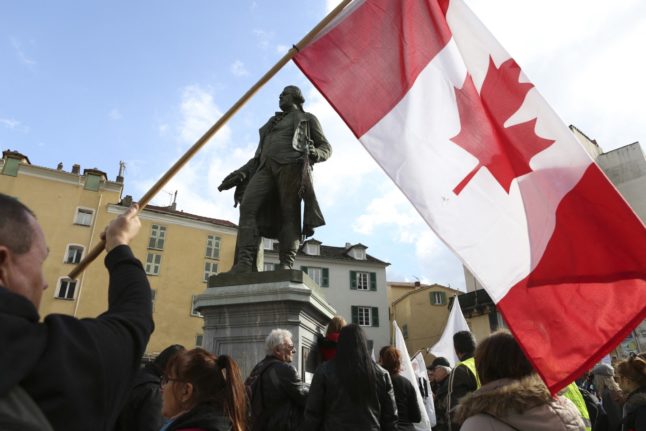Easter itself falls very early this year: Easter Sunday also coincides with the clocks going forward an hour for summertime, while Easter Monday in 2024 is on April Fool’s Day.
France is, famously, a secular state but for historic reasons, it also has plenty of days off work for Christian holidays. At Easter, however, most of the country gets just one extra day off – Easter Monday – while Good Friday is a normal working day.
You can also expect Easter celebrations including egg hunts, special markets and – in one region – mock crucifixions.
Giant omelettes and flying bells – how the French celebrate Easter
Here is what to expect for the weekend;
Good Friday
If you are in Alsace-Lorraine you get both Good Friday (March 29th) and Easter Monday (April 2nd) off because of an historic war with Germany and powerful trade unions. In Alsace, you can expect closures and altered hours will resemble those on Easter Sunday and Monday.
However, the rest of France has school and work on Good Friday and as such, opening hours will be normal. If you work in a French company, don’t be surprised to see your colleagues coming into work with suitcases and sloping off early.
As many people will be taking the opportunity to go away for a long weekend, traffic is predicted to be heavy on the roads on Friday early afternoon and evening, especially heading out of cities and towards the coast. Traffic heading our of Paris will be particularly intense.
Likewise trains will be busy on Friday afternoon, with many trains completely booked out.
Saturday
Opening hours across the country will function as they normally do on Saturday.
Easter Sunday and Easter Monday
You can expect smaller or independent shops to be closed on Monday, while supermarkets may operate shorter opening hours, particularly on Easter Monday.
Schools have Monday off.
On Monday evening traffic will again be heavy on the roads as those holidaymakers head back into the city to start work and school again on Tuesday.
No TGVs will run between Bordeaux and Toulouse on Easter Sunday or Easter Monday because of pre-planned works.
There are no services between Orléans and Paris on the same two days for the same reason.
Public transport
City public transport runs all throughout the holiday period, albeit often with a slightly reduced timetable as there are usually fewer people travelling. Sunday-level services may operate on Easter Monday, for example.
But mainline train services also run across the period, with many routes running a near-normal timetable.
READ ALSO Why 2024 is a very good year for holidays in France
Boulangeries, pâtisseries and florists
Boulangeries or pâtisseries will be open pretty much as normal across the Easter weekend – but do watch out for notices advertising some opening hour changes. But, on the whole, you will be able to buy your necessary breakfast pastries and fresh baguettes, as well as a suitable gateau for the traditional Easter celebration with loved ones.
Supermarkets
Supermarkets may operate shorter hours on Easter Monday (and on Friday in Alsace). Independent shops in towns and cities may well remain closed for the day, but franchise stores are likely to open, as will restaurants and cafes.
What about schools?
Schools in France will be closed on Easter Monday, but open as normal on Good Friday in all but the Alsace region. Pupils also get a two-week holiday around the Easter period, at different dates depending on the school holiday zones. None of the holiday dates are directly linked to Easter itself this year.
Schools in Zone C are off from Saturday, April 6th, and return on Monday, April 22nd; schools in Zone A are on holiday from Saturday, April 13th, returning on Monday, April 29th; and those in Zone B are off from Saturday, April 20th, returning on Monday, May 6th – in time to be off again for for three days because of VE Day on May 8th, and the Ascension holidays on May 9th and 10th.
Meanwhile, in Corsica, pupils are off from Saturday, April 27th, returning to classes on Monday, May 13th.
Doctors, pharmacies
Doctors’ surgeries are usually closed on public holidays, such as Easter Monday, but you can still get a non-emergency medical appointment via on-call medical centres known as maisons médicales de garde that provide care at weekends, nights or on public holidays when surgeries and doctors’ practices are closed.
Call 116 or 117 to contact your nearest on-call centre or log on to the maisonsmedicale.com. website. Be aware, consultations from on-call services like this are more expensive.
SOS Médecins will also operate as usual, and hospital emergency departments and ambulances will be available if you need them (dial 15 for an ambulance, or call the European number on 112).
Similarly, pharmacies operate a rota system to ensure that at least one is open in each area. To find your nearest, Google ‘pharmacie de garde’ plus the name of your commune.
Tourist attractions
Many tourist attractions will be open as normal throughout the Easter period, including Good Friday and Easter Monday (the Louvre, for example, is open as usual on both days) but some may operate altered opening hours. Check individual attraction’s website before visiting.
Salary payments
If you are a salaried employee in France you may find that your March pay-packet arrives late. This is due to European banking regulations combined with the fact that the Easter weekend is also the end of the month this year.
The European SEPA payment system for automated bank transfers takes a four-day break over Easter, so any bank transfers that you send over the weekend will not arrive until Tuesday.



 Please whitelist us to continue reading.
Please whitelist us to continue reading.
Member comments